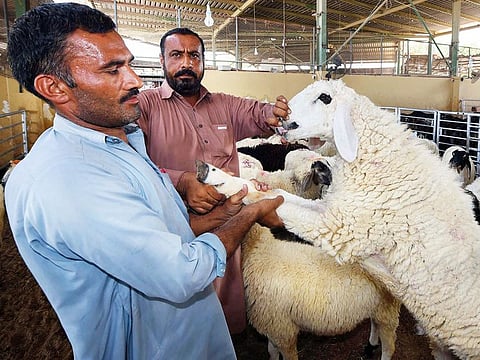Higher costs, lower supply push up Eid livestock prices
Traders pay more for air freight, fewer countries sending stocks this year

Also In This Package
Dubai: Customers will have to pay more for sacrificial goats and sheep this Eid Al Adha because of higher transport costs and lower supply of the livestock, traders at Dubai Cattle Market said on Wednesday.
Livestock from India, which is in huge demand, is being flown in rather than shipped by sea, adding to their transport cost, the traders added. Also, according to the traders, Pakistan is not exporting livestock this Eid season so it can meet its domestic demand. Livestock from Iran and Australia are also not available, they said. Cheaper Somali livestock, which cost Dh400 to Dh500 per head, was not available at a number of sheds at the market when Gulf News visited on Wednesday.
Going prices on Wednesday were around Dh2,000 for a large goat or sheep (around 35kg) and Dh600 for a small one (around 15kg). Some traders were asking Dh2,500 to Dh3,000 for larger goats weighing around 40kg. One trader wanted Dh3,500 for an “80kg” goat.
Mahmoud Ghanmi, an Egyptian customer, said when he visited the cattle market a month ago, prices for larger goats were just Dh600 or so. “Now a goat about the same size is Dh2,000 — the prices are too high,” he added.
Livestock prices are influenced by supply and demand, the animal’s weight, health, variety, the country of origin — and haggling skills of the customer.
Prices could rise further, peaking on the first day of Eid Al Adha, which this year falls on August 11. Muslims are typically keen to slaughter a goat or sheep on the first day of Eid Al Adha, “the festival of sacrifice”, although the rite can technically be performed on the second and third day as well, when prices come back down.
Higher costs
Traders said prices have risen because business costs have increased.
“It used to cost Dh600 or Dh700 to bring in one animal by ship, but during the three months of summer [June, July, August], livestock are only imported by air, which costs Dh1,000 or Dh1,200 per animal. Then there is the rent of keeping them at the cattle market and overheads like water and food for the animals, and salaries for the salesmen,” said Mohammad Nawaz, a Pakistani trader.
“We have to pass on this cost to the customer, even though we try not to make our margins wide. But there are still some days left for Eid and more animals will come in. Many people are away on holiday so it’s possible the prices won’t climb much higher than they are right now.”
Another trader, Ghulam Abbas, said there were fewer livestock from India because of monsoon floods there, while Pakistan was not sending out its supply of animals for Eid.
“Together with the added air freight, the lower supply this Eid season has pushed up prices higher than last year,” Abbas added.
Mohammad Faisal, a trader from Pakistan, also said the prices were higher. A local variety of goat, the “mahali”, was going for Dh2,000 per animal at Faisal’s trading shed at the market on Wednesday. He said local varieties are normally cheaper than imported ones, but this year have increased in price.
Going livestock prices, Dubai Cattle Market*
80kg Indian goat: Dh3,500
40kg Indian goat: Dh2,500 to Dh3,000
35kg Indian goat: Dh2,000
20kg Indian sheep: 1,400
15kg sheep: Dh1,000
13kg sheep: Dh700
15kg UAE goat: Dh600
*As quoted by traders on Wednesday
What is Eid Al Adha?
Eid Al Adha is a festival in Islam known as the festival of sacrifice. It falls on the 10th day of the Islamic month of Dhu Al Hijja, the month named after the annual Haj to Makkah, Saudi Arabia.
Muslims believe Prophet Abraham was commanded by God to sacrifice his son Esmail. When Abraham was about to carry out the command, God accepted his spirit of obedience and a goat was sacrificed instead. To honour Prophet Abraham’s response, Muslims sacrifice a goat, sheep, cow or camel for Eid Al Adha, which lasts till the 13th of Dhu Al Hijja.
It is recommended to cook part of the sacrificial meat for the family, gift a part to relatives and needy and give a part in charity. The days of Eid Al Adha are an occasion to enjoy food and drink, wear new clothes, visit each other, give gifts to children and perform acts of worship.
— F.M.



